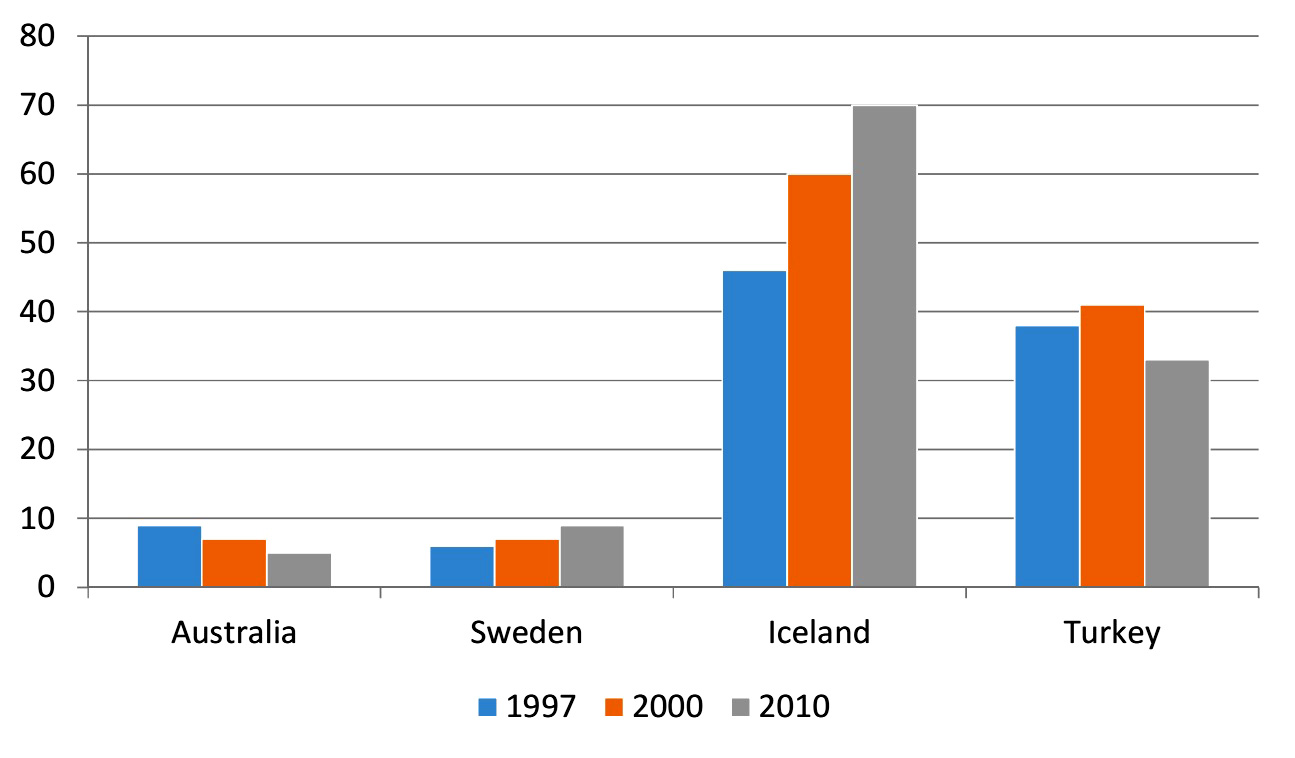The chart shows the proportion of renewable energy in total energy supply in 4 countries from 1997 to 2010.
Write at least 150 words.

It is neither possible nor useful for a country to provide university places for a high proportion of young people. To what extent do you agree or disagree?
Give reasons for your answer and include any relevant examples from your own knowledge or experience.
Write at least 250 words.
WRITING TASK 1
The given bar chart presents data about the percentages of renewable energy with regards to the total energy production in four different countries (Australia, Sweden, Iceland and Turkey) in three years; 1997, 2000 and 2010.
Overall, Sweden and Iceland witnessed an upward trend in the use of renewable energy sources in the three examined years. It can also be seen that among the four countries, this type of energy was most popular in Iceland.
In 1997, almost half of the total energy produced in Iceland came from renewable resources. This figure continued to climb steadily to 60% in 2000 and more than 70% in 2010. Meanwhile, in 1997, only approximately 5% of the entire amount of energy produced was generated from natural resources in Sweden, who experienced a similar trend to that of Iceland in regards to proportion of renewable energy produced.
Regarding Australia, nearly 10% of the energy supply was from renewable resources in 1997, and this figure decreased slightly to around 5% in 2010. Similarly, the percentage of renewable energy used in Turkey experienced a decline over the years from approximately 37% in 1997 down to just under 35% in 2010.
(193 words)
WRITING TASK 2
There has been a difference of opinions regarding the accessibility of tertiary education to the majority of young people. In my view, dispensing university educational services on such a large scale brings about no practical values to society, and in addition, is rather unfeasible to carry out.
Firstly, widespread entry into university does not seem really useful to a country since it is necessary for the government to take the needs of both the youth and the economy into consideration. In many countries, especially Germany, vocational training has gained more popularity among young people because it enhances employment opportunities as well as job security upon completion. Furthermore, if everyone could gain admittance to college, it would lead to imbalances in the workforce that would greatly damage the economic structure of a country. This is because there is little chance that university graduates would choose blue-collar jobs such as working in factories, over the jobs that they are qualified for.
Secondly, I think that it is impossible to provide almost all young people with access to tertiary education. In Vietnam, the demand for entering college never ceases to grow. This puts the government in a dilemma of whether they should risk allocating their resources and therefore face the possibility of bankruptcy due to exorbitant education costs in many financially independent universities, such as the Foreign Trade University or the National Economics University. Furthermore, it is simply unrealistic for universities to accommodate such a sudden increase in the number of students on campus, not to mention the fact that most departments are currently short-staffed.
In conclusion, I strongly oppose the idea of supplying entry to a high proportion of young people owing to the arguments presented above.
(285 words)
